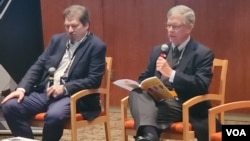Four VOA journalists, who lead news coverage in key regions, explained the network’s editorial approach to coverage of disinformation during a global media forum hosted by the University of Texas at Austin.
“Almost everything we do is to combat disinformation,” said Leili Soltani, director of VOA’s Persian-language programming to Iran. Soltani joined her VOA colleagues on the panel “Around the World with VOA News: Countering Disinformation & Attacks on Freedom of Expression,” as part of the three-day Connexions conference sponsored by the university’s Eurasian studies center and the institution’s Global Disinformation Lab.
“We basically dispute straight-out lies,” added Xin Chen, VOA Mandarin managing editor, pointing to the service’s fact-checking site. She said China’s disinformation efforts are so pervasive that much of her newsroom’s coverage involves exposing false or misleading stories and narratives promoted by Chinese state media.
VOA Eastern Europe Chief Myroslava Gongadze said that in Ukraine last year, VOA signed contracts with 52 local and national media organizations. “The fact that the audience and the media owners want VOA content on their TV channels, this way we are actually flooding the media space with credible information,” she said.
When questioned by a historian whether VOA adheres to its 1980s mission of covering human rights extensively, South and Central Asia Division Director Ayesha Tanzeem said it is “self-evident” that human rights is an important issue that VOA covers extensively for its audiences. “Democratic values, freedom of press, human rights, accuracy – a lot of emphasis on accuracy,” she said, “Because this is how you distinguish yourselves from being a propaganda outlet and a news outlet that’s trusted.”
In a separate session called “Piercing the Armor of Russian Propaganda,” VOA Russian-language reporter Danila Galperovich likened Russia’s flexible and massive disinformation campaign to “something that is the structure of a jellyfish.” He said Russian President Vladimir Putin at first aimed his propaganda efforts at fellow Russians after taking office, initiating “disbelief in local elections,” before expanding later to former Soviet states and then to other regions around the globe, including the U.S.
“It turns really nasty during the annexation of Crimea. I remember, myself, that I could feel the change of the tone of Russian propaganda and the wave of this hatred, this dehumanization of Ukrainians,” said Galperovich, who started a podcast on disinformation at the beginning of the 2021 Russian invasion.
Gongadze was also a moderator, along with former U.S. Agency for Government Media executive Jeff Trimble, in the opening keynote session with Ukrainian Ambassador Oksana Markarova. Gongadze labeled the current conflict as a “digital war.” Markarova thanked reporters who have traveled to Ukraine covering Russia’s invasion, Ukraine’s counteroffensives and the discovery of atrocities, helping make it the first war that can be followed almost entirely online.
Organizers expect the Connexions conference will become an annual event. It brought together approximately 60 speakers and estimates of close to 300 participants in a hybrid setting on both the UT (Austin) campus and a virtual platform.





